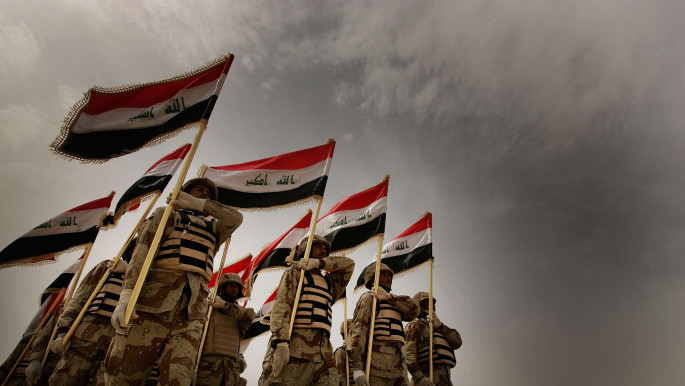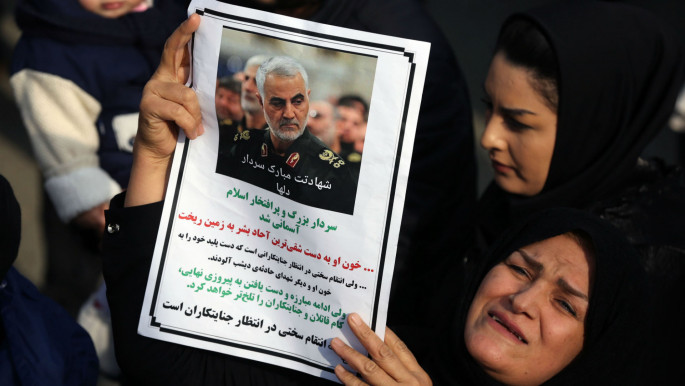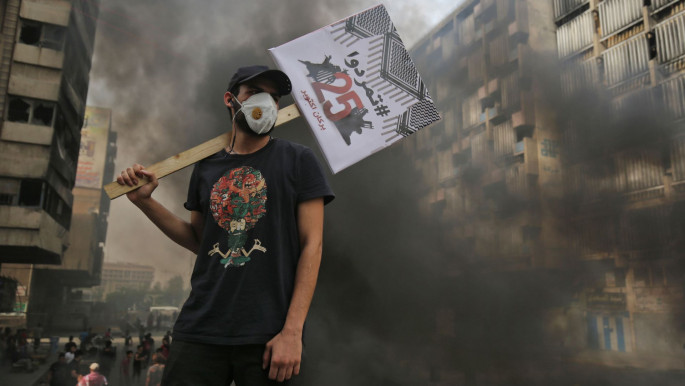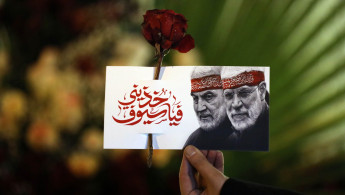A year after Soleimani's killing, tensions simmer in Iraq
Head of Iran's Revolutionary Guard's elite Quds Force, responsible for the Islamic Republic's foreign operations, Soleimani was killed together with his right-hand man in Iraq, militia leader Abu Mahdi al-Muhandis.
Over the weekend, thousands of mourners dressed in black attended candle-lit vigils, while some supporters of the Popular Mobilisation Forces (PMF) burned the Saudi flag in Tahrir Square, but the commemorations took place largely without incident despite anti-American chants.
Iran's judiciary chief Ebrahim Raisi warned on Friday that Qasem Soleimani's killers will "not be safe on Earth", as the Islamic republic began marking the first anniversary of the top general's assassination. Speaking at an event in Tehran to pay tribute to Soleimani, he said not even US President Donald Trump, who ordered the strike, was "immune from justice".
Despite heated rhetoric there has yet to be a large-scale response to the high-profile assassination, although analysts say it is still very much a possibility. Others suggest any such response could take place at the beginning of the Biden administration, rather than in the last days of Trump.
 |
Groups that traditionally target American interests are now retreating, as new groups appear, more aggressive and unpredictable |  |
There will "surely be a message of some sort in conjunction with 3 January," Sajad Jiyad, an analyst in Baghdad for The Century Foundation, told The New Arab. "Then it will all depend on the magnitude of this message and the American response."
Tensions and rumours of revenge
Despite fears in Washington that Tehran could retaliate for the killing on the anniversary, Sunday passed without incident. Baghdad had been under high alert for days before the weekend, with a nervous calm enforced by the Counter Terrorism Service (CTS) through roadblocks and controls at checkpoints, all under the watchful eye of commemorative portraits of the two generals.
 |
|
| Read more: What will a Biden presidency mean for Iraq? |
The US Embassy in Baghdad also posted on Facebook that it had "provided 30 armored cars to the Iraqi military" and is "committed to supporting it in maintaining national security." Since Soleimani's death, rocket attacks that began in October 2019 against the US embassy and the Green Zone in Baghdad have intensified. The latest attack on 20 December damaged embassy buildings and was defined by some international media as "the largest in a decade."
"The attacks now use Grad rockets, which are more lethal than the usual 107mm. We are also seeing more attacks on US logistics convoys in southern Shiite provinces, with IEDs (improvised explosive devices)," an officer from the Iraqi National Intelligence Service told The New Arab.
Commemorations by the PMF are set to continue until 15 January in a less public way than the past weekend, and at their headquarters in Baghdad's Jadriyah and Karrada districts many militias are keeping a low profile. Contacted by telephone, several leaders and spokespeople refused to be interviewed. A militiaman who preferred to remain anonymous told The New Arab that they were "told to wait and see what happens this weekend and after".
Yet militias have been imposing their will on Iraq's political and social scene, making increasingly overt threats against the Iraqi government and Prime Minister Mustafa al-Kadhimi. In contrast to the relative calm on the streets, the atmosphere has been heating up for weeks on social media networks. In a Facebook video at the end of December, unknown militiamen who pledge allegiance to the Shia political party and militia Asaib Ahl Al Haq (AAH) threatened to take on the government.
 |
Kadhimi wants to survive until the elections. He will avoid confrontation from now on because he knows that it is no longer possible to find a short-term solution |  |
A few days later, another video by Harakat al-Nujaba, a Shia paramilitary group, threatened to use drones against US interests in Iraq. In the same month, a member of the group's political bureau said in an interview with Lebanon's Al-Mayadeen TV that the US embassy in Baghdad "is not a diplomatic mission but a military barracks", accusing parties on Washington's payroll of being behind the attack on 20 December.
Kadhimi: Between survival and authority
Kataib Hezbollah, AAH and other pro-Iranian militias systematically deny responsibility for the rocket attacks, but the Iraqi government's investigations prove otherwise. Members of AAH were arrested after the 20 December attack, and despite protests from a group of militiamen in the streets of Baghdad five days later, Kadhimi did not give in. At least for now.
"You will see, they will be released as soon as possible," the Iraqi intelligence officer told The New Arab. "The government will be under all kinds of pressure until these people are released and knows that if the arrests continue, the risk is civil war." Abu Ali al-Askeri, a Kataib Hezbollah spokesperson, tweeted after the arrests that Kadhimi "must not test the patience of Iranian and foreign resistance, because neither the intelligence service nor the United States could protect him".
 |
|
| Read more: The significance of Qasem Soleimani's assassination |
"Kadhimi wants to survive until the elections," explained Sajad Jiyad. "He will avoid confrontation from now on because he knows that it is no longer possible to find a short-term solution. Although he realises that with every attack he loses his legitimacy and authority. "
However, according to Hamdi Malik, a London-based expert on Shia and pro-Iran militias, in recent months the prime minister has "replaced several soldiers and security agents with figures less close to Iran and limited the presence of Kataib Hezbollah in the Green Zone and the Baghdad airport".
 |
The potential for escalation is there, but neither the Americans nor the Iranians want to trigger it |  |
New armed groups
Another key issue for the Iraqi government and the US is the proliferation of threats. "Groups that traditionally target American interests are now retreating, as new groups appear, more aggressive and unpredictable," Sajad Jiyad says. Although in the theory there is still a ceasefire at the moment with the Americans, "these new groups have been targeting convoys bringing supplies for US forces. They are very aggressive domestic-wise," Jiyad adds.
Such groups were likely behind the attack on a Baghdad massage parlour in November, protests at the French embassy in October, and bomb attacks on liquor stores in recent months. "The risk is that these new small groups might escalate quite quickly," he says.
 |
|
| 'They are still trying to silence us': One year on, Iraq's youth rise again |
At the same time, new groups can take advantage of the internal disputes within the PMF in recent years. For example, at least four factions linked to the shrines of Iraq's twin holy cities, Karbala and Najaf, known as the 'Shrine Hashed', have complained about being penalised in the allocation of equipment and salaries, with reports of desires to break away.
Asaib Ahl Al Haq chief Qais al-Khazali told Iraqi media in November that this could spur other groups to pursue independence. "It would mean the end of the Hashed," he said. While the PMF risks collapse, the US and Iran are also losing ground in the face of the emergence of these new groups, which advocate a fight against the Iraqi government beyond all allegiance to Iran.
"Damaged by the sanctions, Tehran wants to avoid any sort of escalation during the last weeks of the Trump administration in order to be in the best position to start negotiations with Biden and ease the tension. Any American victim would compromise this plan," Hamdi Malik says.
"On the other hand, the Islamic Republic needs a victory to show that the death of its commander has been avenged. So, the attacks will continue, but not in a coordinated way". Jiyad agrees. "The potential for escalation is there," he told The New Arab, "but neither the Americans nor the Iranians want to trigger it".
Sofia Nitti is an Italian video journalist based in Baghdad, Iraq
Follow her on Twitter: @SofiaNitti


![President Pezeshkian has denounced Israel's attacks on Lebanon [Getty]](/sites/default/files/styles/image_684x385/public/2173482924.jpeg?h=a5f2f23a&itok=q3evVtko)



 Follow the Middle East's top stories in English at The New Arab on Google News
Follow the Middle East's top stories in English at The New Arab on Google News


